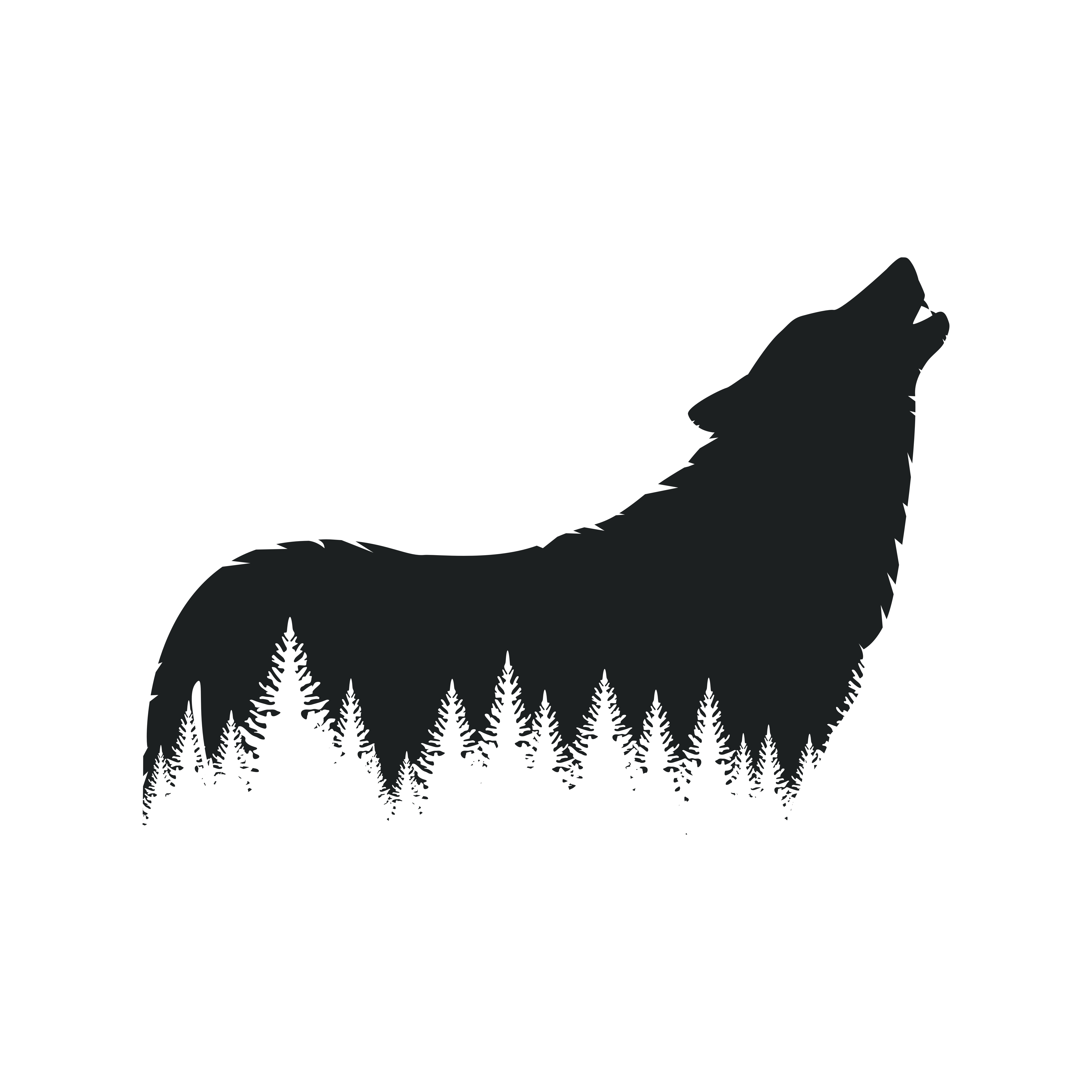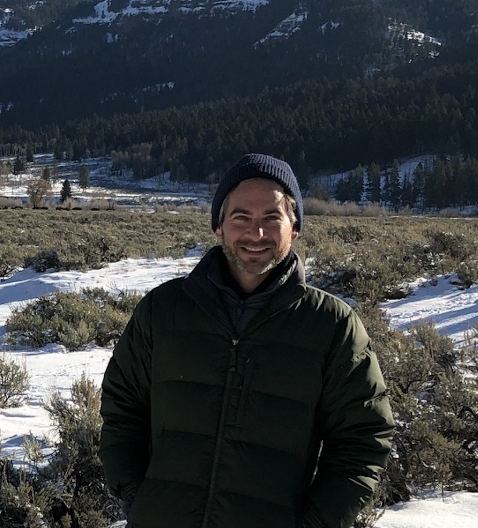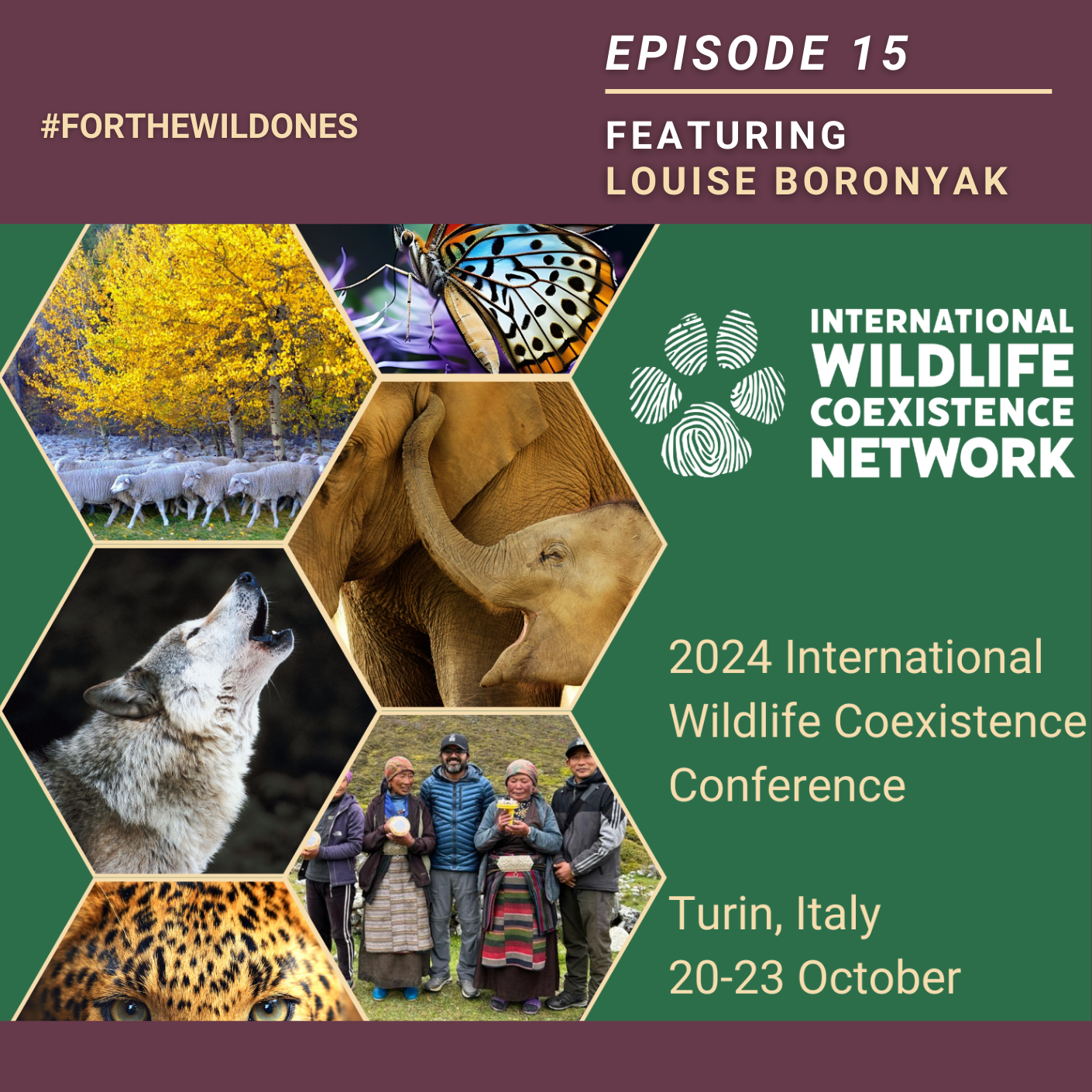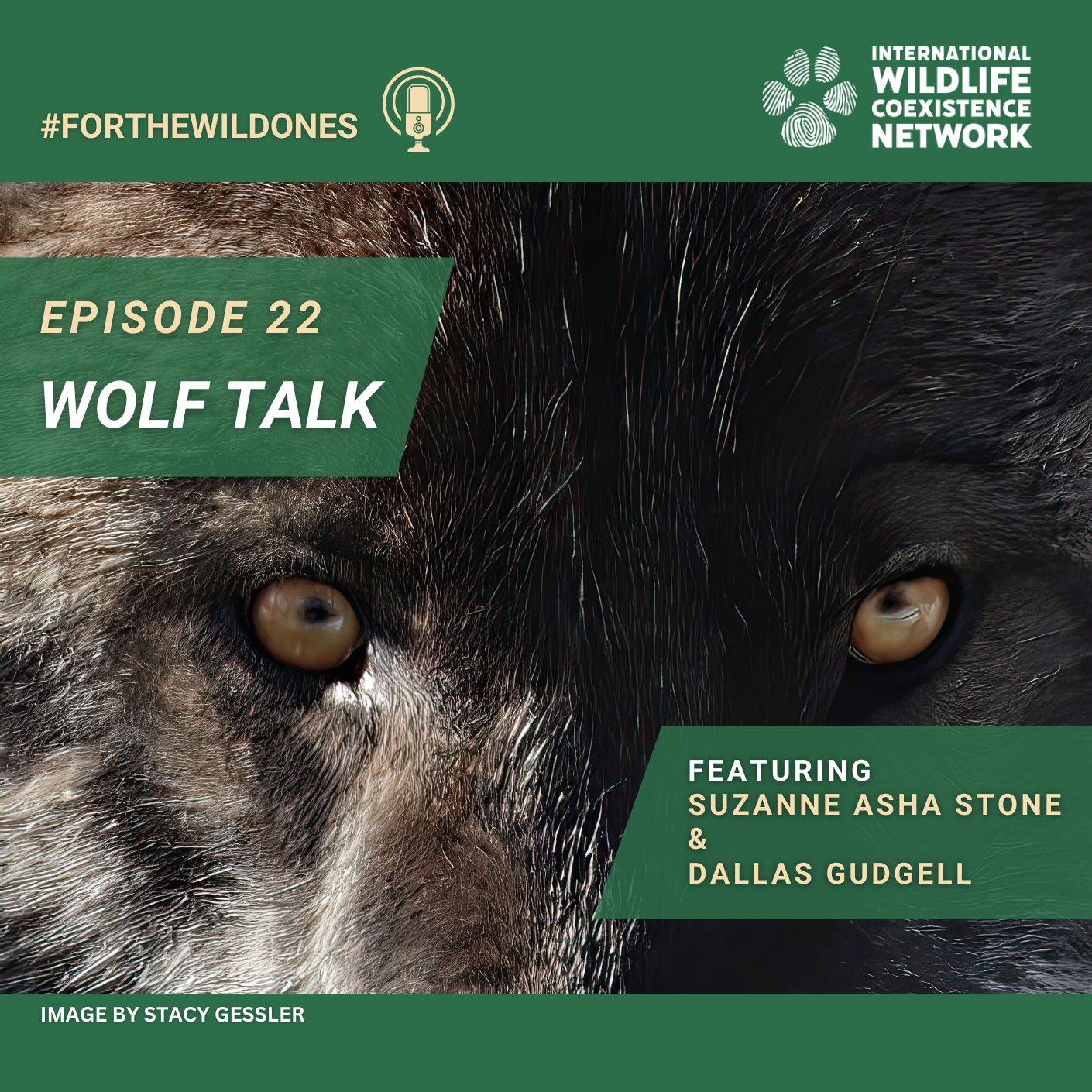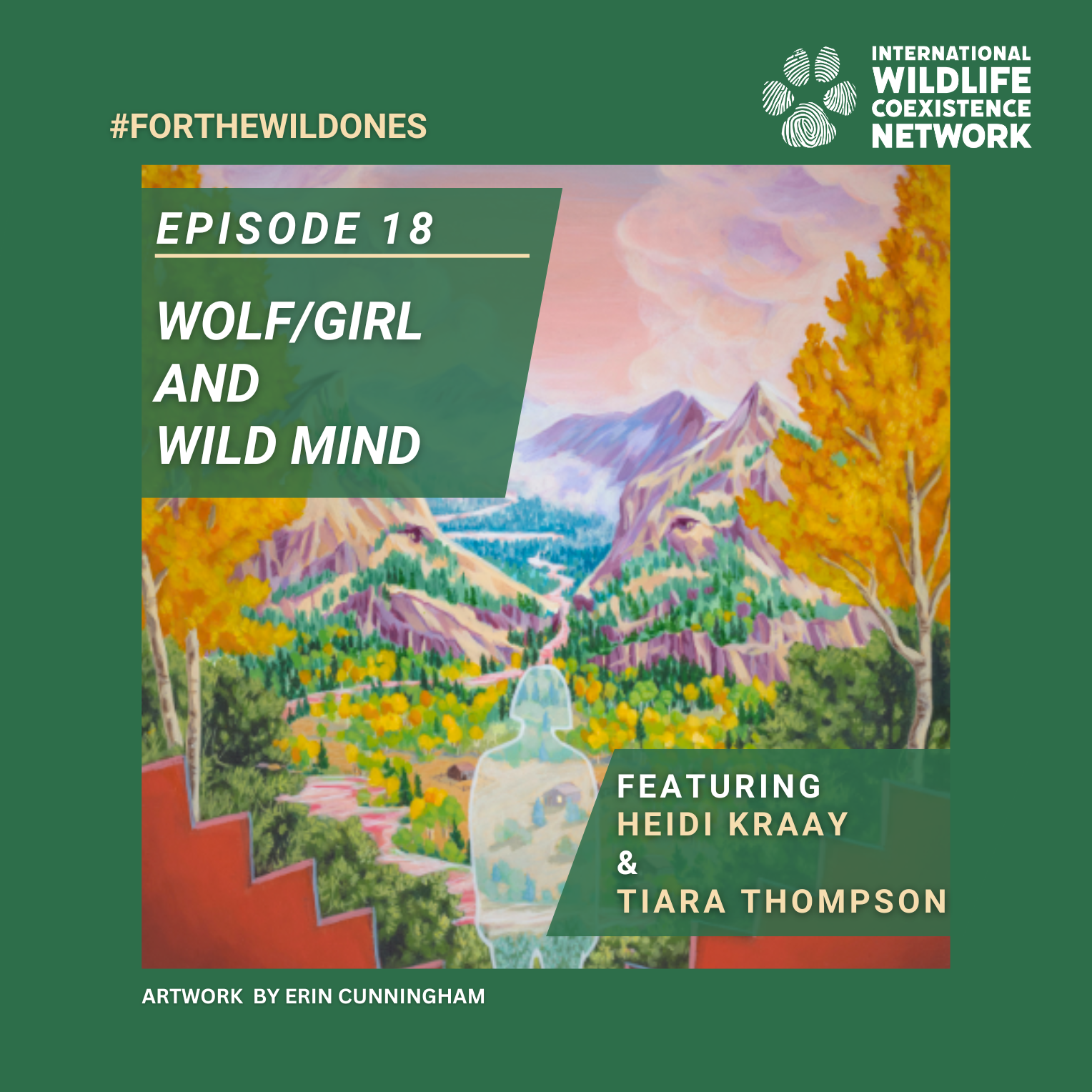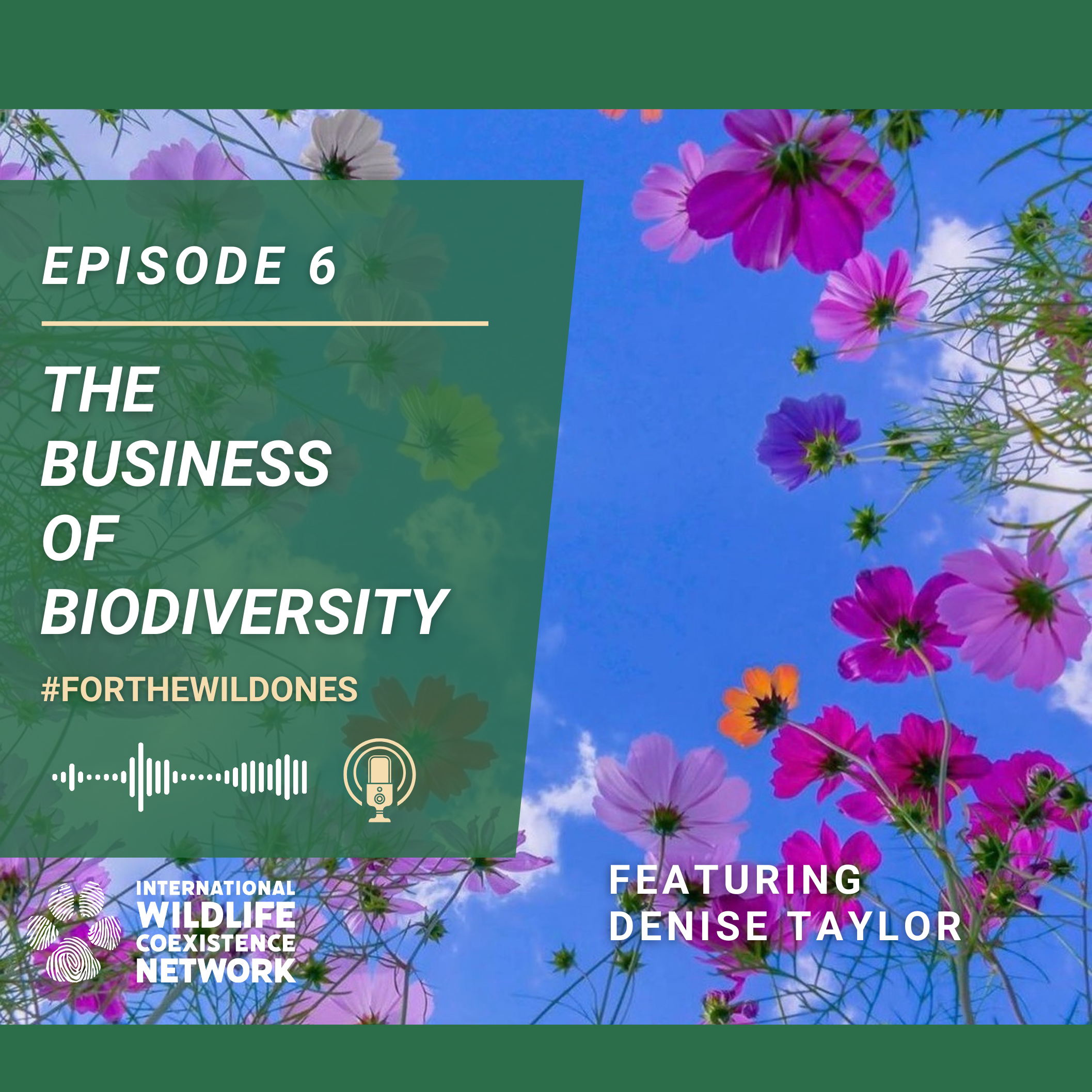Episode Transcript
[00:00:05] HOST: Welcome to a special episode of for.
[00:00:07] HOST: The Wild Ones podcast brought to you by the International Wildlife Coexistence Network. I'm your host, Josh Adler.
This episode focuses on our upcoming conference, which we hold every two years at a different location. Our last conference was near Yellowstone National Park. I would describe it as a transformational event, which allowed me to absorb the latest in coexistence research and best practices, connect with wildlife, and participate in a growing community that is improving human wildlife relations around the world. To unpack more of the offerings, opportunities, and invitations of this year's conference, we're joined by our conference producer, doctor Louise Broniak from Sydney, Australia.
[00:01:02] HOST: Thank you, Louise, for joining us to talk about the International Wildlife Coexistence Network's upcoming conference. It's in the exciting location of Turin or Torino, Italy.
[00:01:18] GUEST: Yeah, coexistence is essentially a really big challenge that we're facing around the world. How we transform, how we relate to wildlife and turning that relationship from one of conflict over resources to one of living together peacefully is certainly the challenge of our age in the time of biodiversity loss. So it's really important that we get together the best minds in this field to discuss how we can go about it. How can we engage stakeholders? How can we use non lethal tools and practices and strategies to prevent things like livestock predation, which drives a lot of killing of large carnivores? And also how can we protect people's crops from large herbivores that might be coming in? Because there's a lot of forest loss and things like that. So it's certainly quite a complex area, but certainly by getting people together in beautiful Italy, why not? We can share and learn from coexistence projects around the world and research and share not just the things that are working, but also the failures, because we often learn from those. So I think that's really important to get people together in a safe space. And at this conference, as you mentioned, it's a biennial conference. The last conference we had was just, you know, in the outer areas of Yellowstone, which was amazing. It started the conversation. Really interesting insights that came from that around the world, around livestock guardian animals, around non lethal tools and practices, and how we can engage stakeholders and actually help people to become more tolerant towards species that are essentially being a nuisance or really causing quite a conflict or impact on people's livelihoods. And also, how can we boost animal welfare and also the conservation prospects of many of our incredible wildlife that we have on this planet. So the conference runs from the 18th to the 23 October the 18th and 19th consists of exciting field trips. Hopefully we're going to be spotting some wolves around the region. And the 21st to the 23 October is our actual conference. So that's going to consist of keynote speakers, some plenary sessions, a lot of presentations from the best researchers in the field, from the best practitioners in the field, some exciting workshops so we can share ideas and network more, as that's really important, and also some thought provoking panel sessions as well. Really, this conference brings together scientists, indigenous leaders, coexistence practitioners, government, agricultural managers, educators. We also want to involve the arts. It's very important artists, filmmakers, and experts around the world that are experts in dealing with boots on the ground and farming communities or agricultural communities, but also those sorts of people that are all into all the different technologies that we can use. That's a really exciting area. It's really a great opportunity to network with interdisciplinary experts and practitioners in rich cultural and biodiverse landscape in Italy. Our major theme is around integrating coexistence strategies in wildlife conservation hotspot, but it's not just limited to that. We're talking a lot about what are models of coexistence, how we can have more indigenous leadership and innovative technologies to enhance the success of coexistence projects, how we can merge ecotourism and coexistence outreach, what might be the roles of compassionate conservation and science, and how we can have some standards in evaluating and measuring the success of coexistence initiatives, as well as how we can engage, use, and build effective stakeholder partnerships. So it's really going to be a very interesting conference.
It's a hybrid conference, so it's in person, but it's also virtual. So a lot of people that obviously can't travel all the way to Italy, you know, we need these days to be conscious of our air miles and our carbon. So there's an opportunity for people to join virtually and to submit their presentations virtually as well. At the moment we're accepting abstracts. The abstracts are open until the 1 May. You just need to go to our website, wildlifecoexistence.org, and we will be accepting those abstracts. We'll be going through them in this next month and letting people know towards the end of May whether the abstracts have been accepted so people can make their travel plans. We also have an early bird special until the 1 July. It's a very reasonably priced conference. It basically includes all your meals, field trips and accommodation. So it's an all in one thing. And we've hired this incredible compound in the mountains outside of Turin looks absolutely beautiful. And it's going to be fun. It's going to be a historical global gathering to push the agenda of coexistence. And coexistence has become quite topical. The UN have got a on board, and in the Cumming Montreal protocol that came out at the end of 22, they actually noted that coexistence is a real important global imperative, and 195 countries signed up to that. So this is going to be the best minds working together to really build the coexistence of governments to implement coexistence initiatives in their countries. So come join us. It's going to be amazing.
[00:07:15] HOST: That's fantastic. I'm there. I'm excited for the field trips, I'm excited for the presentations.
I want to do all the interdisciplinary breakout sessions, workshops. It's Italy, so the food is going to be exciting. It's a workation village, so it's going to be a little bit chill as well. And I just know from the last conference, it's a fantastic group all the time. It's inspiring people who are really kind and really passionate about what they're doing, trying to make the world better for all life.
Now, let's talk about why we decided to hold this year's conference in Europe.
[00:07:59] GUEST: Yeah. Europe has had a big focus on rewilding landscapes that were sort of denude of wildlife. That's a really important coexistence strategy that's been in play for a while. And because of those rewilding initiatives, we're seeing the rebounding of certain species of wildlife, such as wolves and lynx, and those species migrating, building up their populations on the move, and are coming into contact with more people in agricultural areas, more farmers. And so there is a strong need to therefore build on the success of those conservation initiatives and for them to not then cause people to be upset and retaliate against the wildlife that are trying to recover in those areas. It's really important that we focus on strategies to reduce those impacts away from conflict and transform those relationships more towards living together in the same space and time. Our last conference was quite a heavy north american focus. Europe is a very large and biodiverse region, so it's really important that we cover other areas and come in contact and build networks more across Europe and put those practitioners and researchers in touch with one another that they can share resources. Often this area doesn't have enough resourcing, so it's sharing resources and learning, which is really important. As this field grows larger and larger, and I just wanted to mention, so there are some field trips to sea wolves, which is very exciting, and fingers crossed that we get to encounter some wolves. The other really interesting field trip is apparently this region is where the slow food movement started. And so we're going to be doing some cooking classes. And who doesn't want to learn all nona secrets to italian cooking so we can take those home. I think that's really interesting, and that's what makes this conference a little bit different from your regular environmental or biodiversity conference. It's a really holistic focus. So it's about the food we eat, about movements to do with slow food, that do have a human and environmental dimension, as well as this whole wildlife component, as well about how we can avoid burnout and take care of each other's mental health. As we're really dealing with some really high stakes, high conflict areas and communities, so how we can look after each other as well as our precious wildlife. It's going to be really holistic, diverse conference.
[00:10:40] HOST: It's wonderful how IWCN is able to bring together people from across disciplines, different sectors, into a kind of holistic, practice based approach.
[00:10:52] GUEST: Yeah. And existence is such a complex area that not one discipline is ever going to be able to resolve and get to the heart of that wicked problem. So we do need the arts to engage people. We do need to have filmmakers who make beautiful films that touch our heart and inspire us. We do need to have those researchers that are working with communities, those indigenous leaders that can really teach us a different way of relating to our environment and our beautiful wildlife. So that's really what I see the strengths of the international wildlife existence network because, yeah, it can bring together all these diverse people. We have musicians on our board. We have people that are really into innovative technologies, filmmakers, podcasters, artists. And I think that's really cool and innovative. And it's what we need to push this paradigm forward and enter a new era where we are looking after everybody on the planet. Planet.
[00:11:49] HOST: It's so important to take that time to connect in person, to spend time FaceTime, that's not the digital variety of Facetime.
And to talk about the challenges, the anxieties, the sustainability of our movement, rather than just trying to push through and never feeling like we've done enough, never feeling like we've reached the goal. It's an overwhelming task, this task of achieving coexistence, but we do make progress, and that's another piece of what we share at the conference. Are there?
[00:12:28] GUEST: Yeah, we. Those exciting moments. And when you do have breakthroughs, and when you can see wildlife rebounding and people thriving as well, wildlife and people thriving together, it's so exciting. And we do need to share those wins that come along. My PhD was focused on coexistence, and it was, I think, one of the first phds that specifically focused on that. And what was so exciting at the last conference was that I got to meet in person many researchers that I had cited and read their work as part of my evolution in my learning in this topic. And I think that is exciting in itself, where you're like, wow, I read your paper on this, or I saw your project about that. That helped me realize another piece of the puzzle. And I'm using your learnings or your insight to deal with tackling challenges. For example, I spent a lot of time with Suzanne and learning around all the non lethal tools and techniques that they use at the Wood River Wolf project and talking to different farmers around that area in Idaho and Oregon and Montana. And a lot of those really amazing insights is what I'm using in my work in Australia to reduce conflicts with dingoes. And recently, we had a success. So in northwestern Victoria, where they were killing dingoes in the most brutal way. Leg hold traps, poisons, you name it, it was pretty much an annihilation. And now the government, because of our pressure and various groups working together, which was amazing, we have secured a change in law. And now farmers in that northwest region are compelled by law to just use non lethal tools and techniques. So we're really working around the clock to encourage greater adoption of livestock guardian dogs and even livestock guardian donkeys that can be used to protect livestock and paddock from dingoes encroaching in that area and causing depredation. We want to prevent those depredation events before they happen. So this would not have been possible if I didn't learn and see and talk to people and have those experiences with people. And I have taken that back to my own country. And we're very slowly and painfully encouraging greater coexistence here. And that's why it's really important to get together at this global conference and learn from one another.
[00:14:53] HOST: That's really exciting news. I had no idea, Louise. That's so exciting.
[00:14:58] GUEST: Great success.
[00:14:59] HOST: I should note that you're also an innovator in this field. You're the one for me who shifted my mindset from non lethal to predator smart. I believe that's your work.
[00:15:11] GUEST: Yes. Wow.
[00:15:12] HOST: This kind of, this may, it's a small note, perhaps, but at the same time. It's this shifting of mindset and attitudes which leads to changing in human behavior and policy.
Every piece contributes to the new era, this kind of new paradigm of understanding and hopefully, harmony.
[00:15:34] GUEST: Josh, that's lovely to hear. And you just. You never know who you can inspire with your work. So that's just so exciting. And, yeah, predator smarts farming is something I've been banging on about for a few years, but it's really a positive way to think about this age old challenge. People want to be seen to be smart, to be outsmarting the predators, and to be using our resources in a smarter way. If we keep fighting against nature, what we find in Australia with dingoes, when we keep this relentless government sanctions and funding that's focused on killing dingoes, trapping them, shooting them, poisoning them, it actually creates more dingoes, because when they're under pressure, they actually have more dingoes. So if we can focus on these non lethal tools and practices that we can really help our farming community. We can actually have much more stable populations of dingoes. And also, when you destabilize dingo families, another dingo pack tries to come in and steal that territory. And that's when predations actually worse. So we want to keep things stable, keep the territories intact, and actually get to the heart of the problem, which is protecting our livestock. A lot of people just leave their livestock out in paddocks. Unprotected. People have their sheep lambing or their cows, their heifers carving. And it's at that time when we actually need to have a lot more protections in place. It's all of these strategies that it's just working smarter, not harder, because it does take a lot of time and effort to go out and set those traps and put those poisons out. And a lot of farmers that have transitioned over to livestock guardian donkeys are actually like, we're saving half a day a week or a day a week. And for a farmer who has a million things to do, a lot of things on their plate, and we've had crazy weather here, we've had a drought, then a flood and fire. They need that time. So if you can work smarter, not harder, and be predator smart, that's definitely a win. And a lot of farmers I'm so excited to see are really taking this on board, and it's really working for them.
[00:17:42] HOST: That's fantastic. Anything else that you feel like we should cover? Regarding the conference, it's really important if.
[00:17:48] GUEST: You want to come to this conference. As we mentioned, there's an early bird special that runs out on the 1 July. But accommodation is limited, and I think space in the conference room is limited to 200 people. And we've had a. A lot of interest in this conference, a lot of people sending in abstracts. And really, we want to showcase the most incredible and interesting and innovative projects and research from around the world. In terms of the abstracts, we're obviously accepting abstracts for traditional presentations, but we're also accepting abstracts for art posters, short films, moving imagery pieces, podcasts, things like that. So there's a lot of opportunities to participate. That's outside of your bog standard academic presentations, which after you have presentation after presentation, it can get like a little bit tedious, even if this subject matter's really interesting. So we do want to break it up, have those interesting workshop sessions. It's going to be a whole focus on wellness, with some experts running yoga in the morning, stretching, various things, incredible food. It's really a holistic focus. Focusing on wellness is really, really, really critical part of it. And there's been a huge spotlight on mental health. And so we really want to pick up on that important movement and progress that's been made towards that. And I also want to just give a shout out to our incredible sponsors, because without them, this conference wouldn't even be able to go ahead. So the Humane Society International, incredible organization that is really working as well on animal welfare, conservation and coexistence initiatives, and also the Animal Welfare Institute, they do incredible work, and we're so grateful to our supporters. And part of that support keeps the cost down for people attending the conference in person, but it also helps us bring incredible keynote speakers out from areas where there might be some economic disadvantage. Ganga Ragh Rami, he's coming from Nepal and he works with snow leopards over there. He does incredible research, also a little bit of research with palace cats and fishing cats. So that's an incredible big cat aspect. We also have a lady who's coming out from the black mambas. They're all female. Anti poaching patrol unit from Africa. One more point. I'm really excited about the indigenous leadership aspect of coexistence. Now, last year in September, we had our first ever indigenous led conference that was focused on dingoes. And for me, being around our aboriginal people, you know, I live in the city of Sydney, I don't often have that opportunity to hear people speaking their own language and to share stories, their dreamtime stories about dingoes and their families. It was so incredibly moving and really powerful for indigenous people to take back that narrative. I mean, I just learned so much, and I just felt like it was such a privilege to be in the room with so many incredible aboriginal rangers and researchers and storytellers and people young and people old. It was really amazing. And we signed our first ever declaration about that dingoes. And it's been, yeah, incredibly powerful. And so I think if we can encourage people that are really working indigenous, led, and really working at that community level, that would be just incredible. For participants in the conference to have that opportunity as well is really powerful.
[00:21:31] HOST: It definitely shifts the frequency and the tone of a room to be in a more relational mindset and to step out of the academic mindset and be able to receive stories as medicine and to be in a healing space, as well as a research space or an information sharing space, educational space.
[00:21:54] GUEST: Yeah. You're leading more from your heart rather than your brain, which I think we need that we need to heal our hearts, because thinking about wildlife loss globally and climate change and things like that is, it's really heavy on the heart. You really hit the nail on the head, Josh, where it really changes the frequency and the way you perceive your world and think about things, and shifting that mindset, which is most incredible way to change our current paradigm that we're in. From conflict to coexistence.
[00:22:24] HOST: It's always an honor and a pleasure. Louise. Thank you so much for taking the time.
[00:22:29] GUEST: Thanks, Josh.
[00:22:32] HOST: Please go to wildlife coexistence.org to register for the conference. You have until May 1 to submit your abstract, if you intend to, and I certainly hope to see you in Italy this fall.
We'll be featuring some of the conference's keynote speakers and special guests on for the Wild Ones podcast. So stay tuned. And as always, stay wild.
